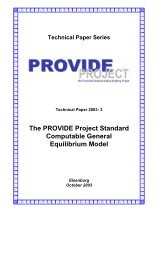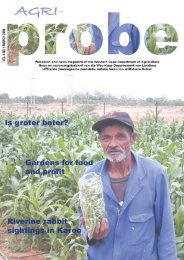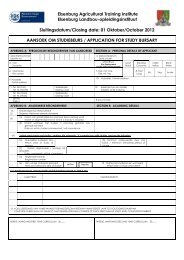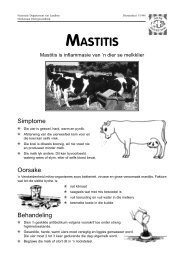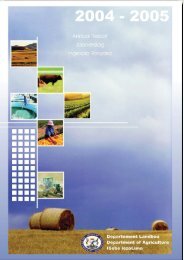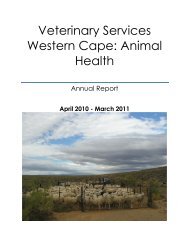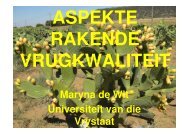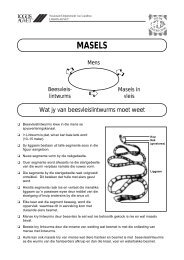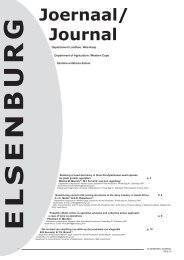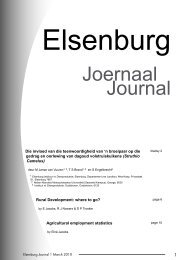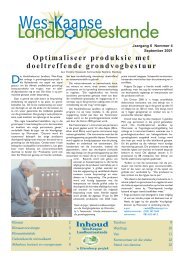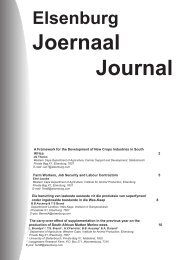honey bush tea - Department of Agriculture: Western Cape
honey bush tea - Department of Agriculture: Western Cape
honey bush tea - Department of Agriculture: Western Cape
You also want an ePaper? Increase the reach of your titles
YUMPU automatically turns print PDFs into web optimized ePapers that Google loves.
<strong>honey</strong><strong>bush</strong> species has, however, diminished over the years, affecting the income <strong>of</strong><br />
the harvesters.<br />
Through intervention <strong>of</strong> various stakeholders, commercial cultivation <strong>of</strong> <strong>honey</strong><strong>bush</strong> has<br />
been encouraged. At present, there are approximately 20 producers and two<br />
communities, which supply seven processors. There are also about 15 marketers that<br />
facilitate the marketing process. The cultivation in the communities is estimated at<br />
approximately 15 hectares <strong>of</strong> dry land. Production per hectare is estimated at between<br />
2 and five tons for sprouting species like Cyclopia intermedia and Cyclopia genistoides<br />
and could be up to 10 tons for higher yielding species such as Cyclopia subternata<br />
(wwwcape<strong>honey</strong><strong>bush</strong><strong>tea</strong>.co.za).<br />
Even the commercial plantings that are available at present are still perceived to be<br />
totally inadequate to represent a meaningful industry. Therefore more hectares devoted<br />
to <strong>honey</strong><strong>bush</strong> cultivation are crucial from both nature conservation and the<br />
establishment <strong>of</strong> the industry especially for efficient development <strong>of</strong> the international<br />
market. The product therefore is a cash crop except the re-sprouting species and can<br />
be ready to be harvested within a year and hence supply can be increased over a short<br />
period <strong>of</strong> time. But, if the situation remains as it is at the moment, this could jeopardise<br />
export opportunities in markets such as Germany, the United Kingdom and Japan<br />
where demand is prevalent for this product.<br />
Another critical factor is rainfall, as production is carried in dryland, which is cost saving<br />
but yield compromising. Rainfall is crucial in <strong>honey</strong><strong>bush</strong> production, as it strongly<br />
affects yield and quality and hence pricing and or optimum margins in both domestic<br />
and international markets. Another critical factor is the absence <strong>of</strong> <strong>of</strong>ficial standards for<br />
taste and flavour, physical properties and micro-organism counts especially for the<br />
international market. In the last eight years though, the industry has seen an<br />
improvement in the quality <strong>of</strong> <strong>tea</strong> and the establishment <strong>of</strong> export standards,<br />
construction <strong>of</strong> large processing and packaging facilities (Wesgro, 1999).<br />
However, the competitive advantage <strong>of</strong> the product lies on its uniqueness to the<br />
<strong>Western</strong> <strong>Cape</strong>, the only area where it is found in its natural habitat. Also, being natural,<br />
organic and the health benefits associated with it can be added to its advantage<br />
28



